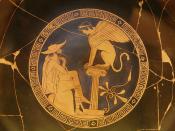'It was you, we remember, a newcomer to Cadmus' town, that broke our bondage to the vile Enchantress. With no foreknowledge or hint that we could give, But, as we truly believe, with the help of God, You gave us back our life. Now, Oedipus great and glorious, we seek your help again.' King Oedipus, the greatest and noblest of all men, is once again being called upon by the Thebans to save the polis from disaster. The Chorus holds Oedipus as the object of universal adoration, but is he really the greatest Theban king ever? Why is it that the chorus neglects to mention any of Oedipus' great contributions to Thebes, except that of defeating the Sphinx. If he were an excellent leader, it seems curious that the only notable thing about his kingship was an act that took place fifteen years and four of his children ago. Was it really Sophocles' intention that we regard Oedipus as a 'good' man? Oedipus accuses Tiresias and Creon, two innocent men, of conspiring to dethrone him and take over the country.
Would a 'good' man do this, lacking any evidence but his own suspicions? Would a 'good' man wish his own brother-in-law dead when no one could even testify to his guilt? Would a 'good' man threaten a timid shepherd with pain and death merely because he was hesitant to reveal the harsh realities of Oedipus' life? Oedipus' tale of meeting Laius is another troubling point. In Colonus he states in plain terms that King Laius would have murdered him had he not killed Laius. In his initial speech to Jocasta on Laius' death he tells a different story. It sounds as though he provoked, or at least escalated, the attack on him, striking the first real blow instead of going...


